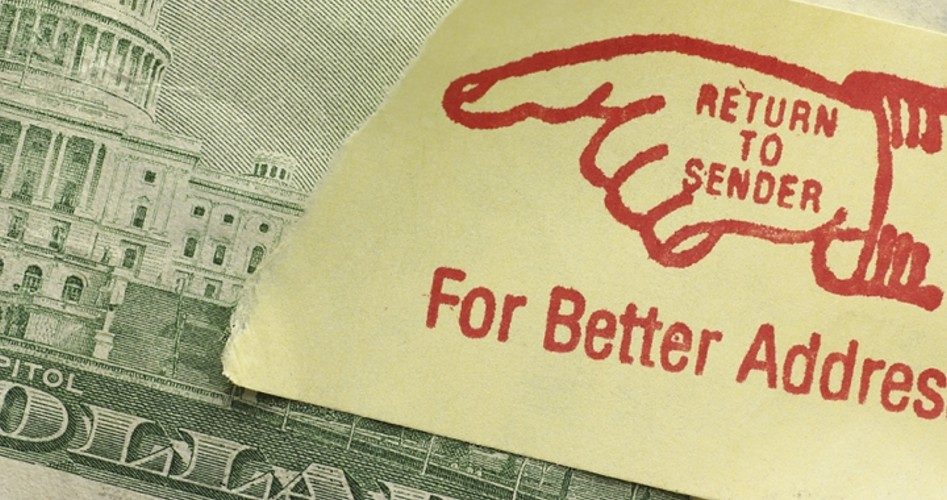
If President Barack Obama thinks weathering the storm of health-insurance cancellations is tough right now, he’d better get himself an ark by this time next year. By then, according to Fox News, there will be a flood of cancellations, affecting as many as 80 million Americans, followed by recriminations from Obama’s fellow Democrats if these and other ObamaCare negatives cost them dearly in the midterm elections.
At present, individual insurance policies are the primary ones being canceled, with approximately 3.5 million Americans affected thus far. Next year, however, group policies, which are typically purchased by employers, will be subjected to ObamaCare — and that’s when the impact of the healthcare law will really be felt.
The American Enterprise Institute’s (AEI) Stan Veuger told Fox News that “at least half the people on employer plans would by 2014 start losing plans.” About 157 million Americans are covered under such plans.
A recent AEI analysis “showed the administration anticipates half to two-thirds of small businesses would have policies canceled or be compelled to send workers onto the ObamaCare exchanges,” wrote Fox News. “They predicted up to 100 million small and large business policies could be canceled next year.”
In fact, the report added, as early as July 2010 — while Obama was still telling Americans that under ObamaCare they could keep their insurance if they liked it — the administration’s “mid-range estimate was that by the end of 2014, 76 percent of small group plans would be cancelled, along with 55 percent of large employer plans.”
Group plans are about to meet the same fate as individual plans for the same reason: ObamaCare mandates all types of benefits that those plans don’t currently provide. By law, insurers must cancel noncompliant policies.
Technically, group plans will be subject to the mandates in January, but many small businesses took advantage of a loophole in the law to keep their current policies in place for another year. “If the businesses renewed their policies early, before the end of 2013, then those plans would not be subject to Obamacare’s costly mandates for a full year, in many cases until December 31, 2014,” noted Forbes’ Scott Gottlieb.
That means that starting next October, insurers will begin mailing cancellation notices to employees covered under these policies.
“These small businesses will be faced with a bleak choice,” observed Gottlieb. “Find another policy that’s compliant with Obamacare, but also more costly. Or put their employees into the Obamacare exchange.”
Just as ObamaCare-compliant individual plans are more expensive than the ones they are replacing, so will ObamaCare-compliant group plans be. For instance, wrote Gottlieb:
Aetna has already warned in its marketing materials that dramatic increases in premiums might be in the offing. “Factors such as essential health benefits, maximum plan deductibles, the application of new taxes and fees and new rating rules will combine to push insurance premiums up substantially for some small businesses,” the insurer said.
In December, Aetna Chief Executive Mark Bertolini said he expects that premiums for individuals or small groups seeking coverage on health insurance exchanges will rise by 20% to 50% in 2014.
Indeed, those employers whose plans have already been canceled “are getting sticker shock at the new, higher prices under ObamaCare,” reported Fox News, citing the example of a Colorado businessman who recently told a congressional panel that ObamaCare is going to increase his company’s health-insurance premiums “by 52.3 percent in January 2014.”
Whether employers and employees were happy with their existing plans is irrelevant to the central planners in Washington. Americans, whether they can afford it or not, will now be forced to have coverage with the benefits that the bureaucrats dictate. If employers cannot afford it, many will simply drop coverage and let their employees buy it on the exchange, where taxpayers will be stuck subsidizing much of it. This is especially true for small businesses that are not subject to the employer mandate, but it will also be true of many larger businesses for which the penalty for dumping workers onto the exchange will still be cheaper than the cost of covering those employees under expensive ObamaCare-compliant policies.
The appearance of cancellation notices in voters’ mailboxes next fall will hardly be welcomed by Democrats. As the party that bears the sole responsibility for inflicting ObamaCare on the nation — and with Obama’s approval rating in free-fall — they could well suffer significant losses at the polls if the healthcare law continues to rankle the public. And 80 million insurance cancellations will surely do plenty of rankling.



